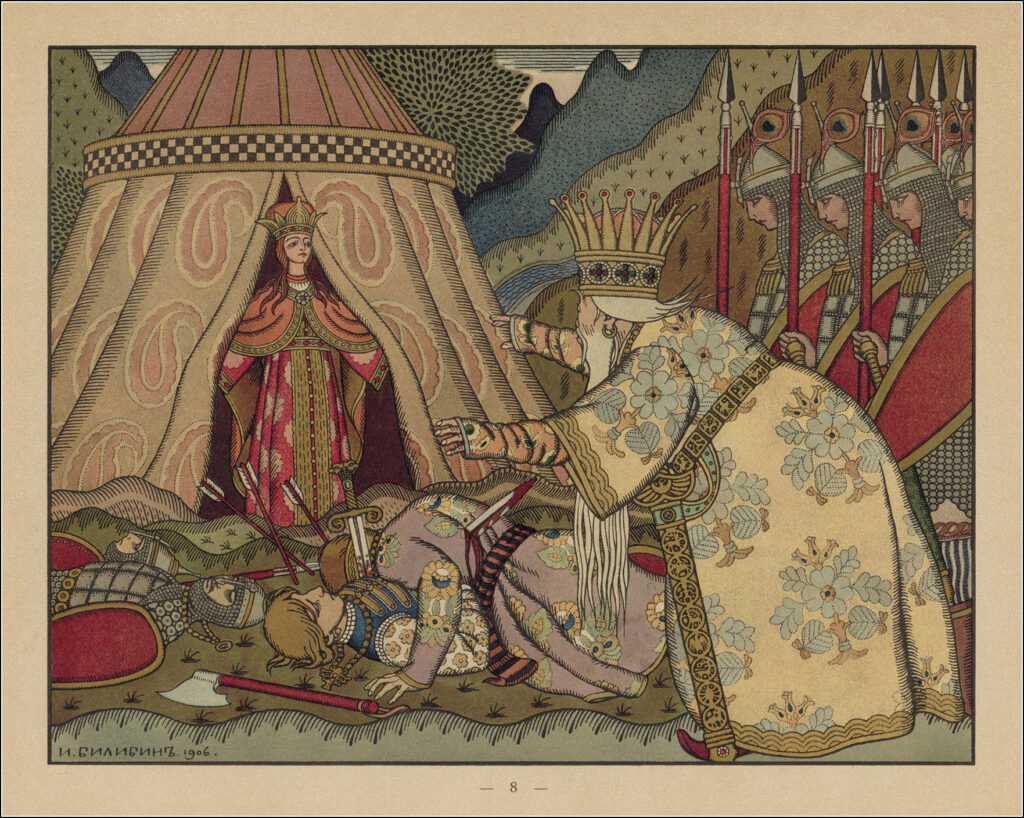
The Golden Cockerel, Ivan Bilibin, credit Wikipedia
Fair is Fowl
Rimsky-Korsakov, The Golden Cockerel, English Touring Opera, the Lighthouse, Poole: Saturday 12th March 2022, reviewed by David Truslove
Given the current tragic events in eastern Europe, an evening of slapstick depicting an inept Tsar overseeing a disastrous foreign policy was somewhat untimely. Had he been able to predict the future, director James Conway might have considered re-locating the action to Spain, taking his cue from Washington Irving’s Tales of the Alhambra (an adaption of Arabian tales) on which Alexander Pushkin based his 1834 fairy tale “Tale of the Golden Cockerel”. Inspired by an Astrologer, the Tsar (aka King Dodon) goes off to war and returns with a princess, only to be pecked to death by a supernatural cockerel. If the rhyming couplets of Vladimir Belsky’s libretto take the edge off Pushkin’s satirical poem, subsequent English translations have further softened the political bite and turned this rooster into a turkey. This version by James Gibson (formerly head of music staff at the Royal Opera) and Antal Dorati is little better than Edward Agate’s trite translation for Drury Lane’s production in 1919, and both detract from the work’s inner darkness.
Not only does the text weaken Pushkin’s politicising, but the delivery from English Touring Opera creates farce. Russian music authority Gerald Abraham aptly refers to Rimsky’s Cockerel as a “death-bed joke”. Neil Irish’s sets provided vivid colours, but the rocking horse and teddy bears for Grant Doyle’s childlike King Dodon reduced everything to panto. As for the phallic canon – enough is enough. Never have I been so relieved to see the final curtain descend.
In this the last of his fifteen stage works, Rimsky’s theatrical instincts finally deserted him. Yet setting aside this production’s horseplay and the absence of any emotional life in the characters, Rimsky was parodying the conventions of Russian opera. This fairy tale is apparently a dream. The only real characters, so we are told, are the Astrologer and Queen of Shemakha.
Vocally, performances were variable; Grant Doyle brings stamina and bellowing to the King, while Edward Hawkins proved effective as the frustrated General Polkan – head of Dodon’s army (more like Dad’s Army). Amy J Payne convinced as the Tsar’s old nanny Amelfa (although what she was doing to Dodon in his Act One dream is anyone’s guess) and Alys Mererid Roberts was suitably strangulated as the cockerel. Thomas Elwin and Jerome Knox made a fine partnership as the Tsar’s foolish sons. But it was Robert Lewis’s Astrologer, dressed as a dishevelled Rasputin, and Paula Sides’ seductive Queen of Shemakha, who brought the most value, delivering their stratospheric roles with aplomb. Despite the tendency to swallow her words, Sides’ Hymn to the Sun in Act Two was the highlight of the evening.
In the pit, Gerry Cornelius kept Iain Farrington’s reduced orchestration moving forward and drew out Rimsky’s rich scoring and his assimilation of folk and oriental influences. Yet despite the music’s artful characterisation, the tiresome libretto does the work no favours. A century ago, The Times critic aptly responded to its English text, as follows, “The Golden Cockerel loses all its wit and nearly all its humour by translation…”. Time for a new version?
By David Truslove










